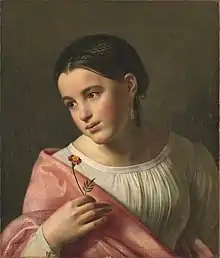Poor Liza
"Poor Liza" (Russian: «Бедная Лиза», romanized: Bednaja Liza)[2] is a 1792 short story or sentimental novella[3] by the Russian author Nikolay Karamzin. It is one of Karamzin's best-known short stories in Russia, where it is part of the school curriculum. It is the tale of two lovers that belong to different social classes[4] which in this case is a young nobleman and a poor peasant girl.[5] The story popularized the sentimentalized peasant girl in 19th-century Russia.[5]
| "Poor Liza" | |
|---|---|
| Short story by Nikolay Karamzin | |
 Depiction of Poor Liza by Orest Kiprensky, 1827 | |
| Original title | Бедная Лиза |
| Country | Russia |
| Language | Russian |
| Genre(s) | sentimentalism |
| Publication | |
| Publication date | 1792[1] |
| Published in English | 1801 |
Summary
Liza is a poor serf girl who lives with her elderly, sick mother. Her father died, making Liza the breadwinner of her family at age 15. One of Liza's primary ways of making money is to sell flowers[6] she picked in Moscow.
Two years later, while Liza is selling lily-of-the-valley flowers, she meets a handsome, rich man named Erast. They fall in love, and begin spending many nights together, next to the Simonov Monastery lake. At Erast's request, Liza keeps him a secret from her mother. What Liza does not know is that Erast, despite a good heart, is weak, fickle, and lecherous. Erast wants to have a pure love with Liza but finds his desire for her growing by the day.
One summer evening, Liza comes to Erast in tears, as her mother wants her to marry a well-off man who she does not love. She declares she can only love Erast, and in the heat of the moment, she loses her virginity to him.[7] Erast promises he will marry Liza, but in reality, he has lost interest in her, as she has become impure to him.
In the autumn, Erast tells Liza that he is going off to war and leaves her. Two months later, when Liza comes to the city, she discovers the truth: in the army, he lost all his money in gambling, and married a rich widow to escape his debt.[8] He gives her a hundred rubles,[7] and tells her to forget him. In her grief, Liza drowns herself in the lake[8] of the monastery garden[6] where she and Erast had spent their time together.
Reception and legacy
Karamzin was a major figure in Russian sentimentalism, and Poor Liza introduced sentimentalism to the Russian public. First, it was widely loved, with many making a pilgrimage to the lake where Liza drowns herself.[9] As time went on, however, it became an object of mockery, with authors like Pushkin making parodic usage of the name Liza in Queen of Spades and "Mistress-Turned-Maid".
The name of Erast Fandorin, the eponymous hero of the detective fiction series, is a direct reference to the novella, for Erast's mother Liza dies in childbirth, and the bitter father names his child Erast for having caused Liza's death. Throughout the series, Erast only falls in love with women named Liza, and they all end with horrible fates.
Depictions
In film
- Poor Liza (2000), dir. Slava Tsukerman[10]
- Poor Liza (Bednaya Liza) (1978),[3] dir. Ideya Garanina
In theatre
- Original production by Bryantsev Youth Theatre, 2018[11]
- Original production by Theatre of Nations
- Original production by Tovstonogov Bolshoi Drama Theater, 1970s[12]
References
- Andrew, Joe (1988-07-06). Women in Russian Literature 1780-1863. Springer. p. 22. ISBN 978-1-349-19295-3. Retrieved 25 June 2021.
- Black, Joseph Laurence; Karamzin, Nikolaĭ Mikhaĭlovich (1975). Essays on Karamzin: Russian Man-of Letters, Political Thinker, Historian, 1766-1826. Mouton. p. 40. ISBN 978-90-279-3251-8. Retrieved 25 June 2021.
- Bendazzi, Giannalberto (2015-10-23). Animation: A World History: Volume II: The Birth of a Style - The Three Markets. CRC Press. ISBN 978-1-317-51990-4. Retrieved 26 June 2021.
- Gogol, Nikolay (2005-12-01). Diary of a Madman, The Government Inspector, & Selected Stories. Penguin UK. ISBN 978-0-14-191002-4. Retrieved 25 June 2021.
- Stites, Richard (2008-10-01). Serfdom, Society, and the Arts in Imperial Russia: The Pleasure and the Power. Yale University Press. p. 206. ISBN 978-0-300-12818-5. Retrieved 25 June 2021.
- Frank, Joseph (2019-12-17). Lectures on Dostoevsky. Princeton University Press. ISBN 978-0-691-18956-7. Retrieved 25 June 2021.
- Proffer, Carl R. (1969). From Karamzin to Bunin: An Anthology of Russian Short Stories. Indiana University Press. p. 4. ISBN 978-0-253-32506-8. Retrieved 27 June 2021.
- Naroditskaya, Inna (2018-11-01). Bewitching Russian Opera: The Tsarina from State to Stage. Oxford University Press. p. 271. ISBN 978-0-19-093187-2. Retrieved 27 June 2021.
- Segel, Harold (1967). The literature of eighteenth-century Russia: An Anthology of Russian Literary Materials of the Age of Classicism and the Enlightenment From the Reign of Peter the Great (1689-1725) to the Reign of Alexander I (1801-1825) (PDF). E. P. Dutton & Co. p. 76. Retrieved June 25, 2021.
- Razor, Sasha (2018-04-14). ""Trust Your Vision": An Interview with the Filmmakers of the Cult Classic "Liquid Sky" (1982)". Los Angeles Review of Books. Retrieved 26 June 2021.
- "Марк Розовский, "Бедная Лиза". По одноименной повести Н. Карамзина" [Mark Rozovsky, "Poor Liza". Based on the eponymous story by N. Karamzin]. www.tyuz-spb.ru/ (in Russian). Retrieved June 26, 2021.
- Вольгуст, Елена. "В СТАРОМОДНОМ ВЕТХОМ ШУШУНЕ" [In an old-fashioned shabby shushan]. Петербургский театральный журнал (in Russian). Retrieved June 26, 2021.